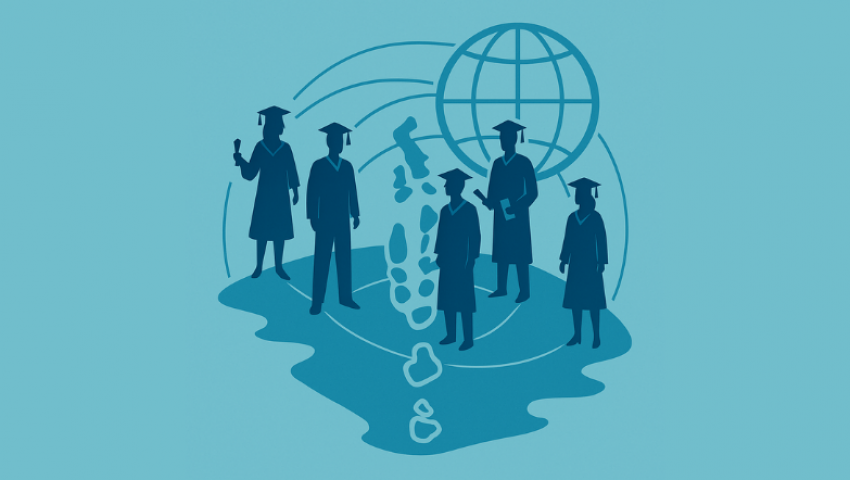
How Maldives’ Brightest Minds Vanish From View
Maldivians often top international universities, but without systems to recognize or retain them, the nation loses its best minds in silence.
In 2024, at a graduation ceremony in Kuala Lumpur, a young woman strode to receive the Chancellor’s Gold Medal, the university’s highest honor. Her name, Aishath Liyana, Republic of Maldives, appeared on the screen alongside a tiny Maldivian flag.
Back in Malé, no one noticed. No headline. No ministerial congratulation. Not even a social-media post from her alma mater.
By the time she returned home, her inbox overflowed with job offers from Dubai, Singapore, and London. The Maldives had produced world-class talent and quietly let it slip away.
The common refrain is: “We don’t have enough talent. Our students aren’t competitive globally.” Yet Maldivian students routinely top their cohorts in Sri Lanka, Bangladesh, Malaysia, Australia, and beyond. Their names appear on Dean’s Lists. They graduate with first-class honors. They co-lead international research teams.
Despite this, no public database exists to log these achievements. There’s no annual awards ceremony. No talent-export report. Even the Ministry of Higher Education lacks consolidated data on Maldivian excellence abroad.
Contrast this with Singapore or Estonia, which meticulously track every global win by their citizens. Their scholars return as advisors, policymakers, and ambassadors. In the Maldives, academic brilliance remains a private victory, never a national celebration.
High-achievers often shy from self-promotion. “I didn’t want to show off,” they say.
In systems thinking, silence isn’t humility, it’s erasure.
We must establish that celebrating success:
- Builds community.
- Creates mentorship opportunities.
- Grants permission to the next generation to be seen.
The nation’s future depends on our willingness to notice, and to celebrate, our own.
At Maldicore, we view the challenge differently. Talent doesn’t stay where it’s born; it stays where it’s recognized, rewarded, and made meaningful. The problem isn’t that Maldivians leave, it’s that we’ve never built the container to hold them.
We don’t need more scholarships. We need a national talent framework that transforms individual achievements into system-level advantage.
South Korea: After decades of brain drain, South Korea launched Brain Korea 21, a program to track and repatriate top scholars. Today, the country leads in AI research and biotech patents and even has a Nobel strategy.
Rwanda: Emerging from conflict, Rwanda created a Scholar Registry that honors every returning PhD. These scholars now drive policy, teach at universities, and launch startups, proving that peace and connectivity are powerful accelerators.
3-Pillar Talent Infrastructure
- Identification: Build a real-time platform to log top-performing Maldivians abroad.
- Integration: Design fellowships that embed returning scholars into national reform efforts.
- Amplification: Launch public storytelling campaigns that shift perceptions of Maldivian capability.
This is strategy, not charity, and it’s overdue.
We lose all our smart students.
→ We never built systems to keep our smart students engaged.
Ask: What return pathways would make them stay or come back?
They don’t want to work here.
→ We haven’t created compelling missions for them.
Action: Co-design local “impact projects” that align with their expertise.
We don’t have experts in this area.
→ We’ve never publicly mapped our expertise.
Solution: Develop a Talent Map to discover hidden experts.
From Blueprint to Breakthrough
- Phase 1: Talent Hub Pilot, Launch a digital Talent Hub by Q4 2025. Recruit twenty known Maldivian scholars abroad to self-register. Test data feeds from target universities.
- Phase 2: Homeward Scholar Grants, By Q1 2026, award three-to-six-month fellowships. Place returning experts in policy labs, universities, and private-sector innovation teams.
- Phase 3: Global Achievers Report, Publish an annual “Global Achievers Report” in mid-2026. Highlight case studies, metrics, and lessons learned to sustain momentum.
- Phase 4: Scale & Sustain, From 2027 onward, onboard 100 fellows per year. Expand partnerships with embassies, alumni networks, and industry sponsors to ensure financial and institutional backing.
Anticipating and Mitigating Roadblocks
- Data Gaps: Incomplete or outdated records may slow platform adoption.
Mitigation: Partner with universities, embassies, and alumni associations to co-create continuous data feeds. - Cultural Resistance: A strong norm of modesty could limit self-nominations.
Mitigation: Run storytelling campaigns that frame recognition as community service, not personal pride. - Funding Constraints: Limited budget for fellowships and platform upkeep may delay rollout.
Mitigation: Secure private-sector sponsorships by demonstrating ROI in policy cycle-time reduction. - Bureaucratic Delays: Procurement and approval processes can stall integration into government bodies.
Mitigation: Establish “fast-track” pilot agreements with clear service-level expectations and timelines.
Who Must Rally Together
- Government Ministries: Education, Youth & Sports, and Innovation must endorse the Talent Hub and allocate co-funding. Universities & Research Institutes: Serve as data partners, host visiting fellows, and validate academic achievements.
- Private Sector Sponsors: Tourism, fisheries, fintech, and renewable energy companies can underwrite fellowships and mission labs.
- Alumni Networks & Embassies: Act as talent scouts, facilitate virtual events, and encourage scholar self-registration.
- Civil Society & Media: Elevate success stories, shift cultural norms, and maintain public accountability for the program’s impact.
Rather than passive complaints, we teach teams to ask: “What signal do we send to our brightest minds, recognition or indifference?”
Every unrecognized scholar costs more than a degree. We lose strategic capacity, 30+ hours per week of research effort. We forfeit potential GDP growth, an estimated 0.5% annually. We dampen inspiration for future generations.
Retention Uplift: Capturing the top 5% of graduates could boost research and policy performance by 18–23%.
Cycle-Time Reduction: Embedding returning experts in public-private innovation teams can halve policy development times, from 12 months to six.
Enrollment Spike: Visibility campaigns in OECD countries have driven STEM applications up by 25%. Each finalist we celebrate becomes a signal that brilliance matters here.
Maldivians aren’t lacking talent; we’re lacking scaffolding. We’re not bleeding out genius, we’re failing to call it home.
We already produce world-class scholars. Now we must produce a system that brings them home.
- Educators: Nominate your top grads abroad.
- Policymakers: Integrate Talent Hub pilots into strategic plans.
- Business Leaders: Sponsor fellowships tied to real-world challenges.
- Alumni & Families: Share stories of Maldivians making waves on the global stage.
At Maldicore, we believe recognition is the catalyst for collective progress. Together, let’s transform silent departures into celebrated homecomings, and build a future shaped by our brightest minds.
Your Role:
- Spot the next gold-medalist before they vanish into foreign job offers.
- Ask: “What system would make you return?”
- Share stories of Maldivians excelling abroad using #MaldivianTalent.
At Maldicore, we believe national identity is built by remembering brilliance, not geography. Let’s co-create a Maldivian Registry of Global Excellence, one achievement at a time.

Maldicore Support
Leave a comment
Your email address will not be published. Required fields are marked *

